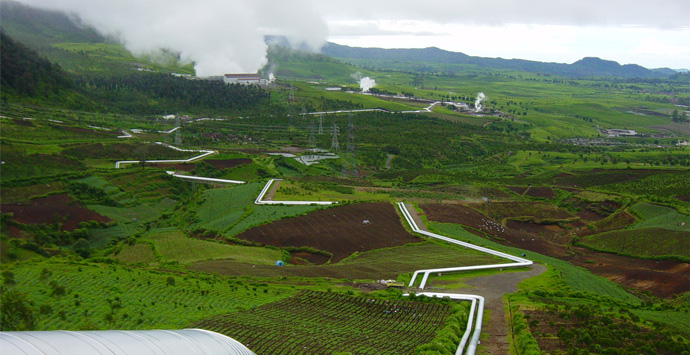Indonesia to add 62 MW in geothermal power generation capacity this year

Indonesia expects three new geothermal power plants to start operation in 2014. The plants of Patuha, Cibuni and Ulumbu will have a combined capacity of 62 MW.
Indonesia will see the start of operation of three new geothermal power plants with a combined generation capacity of 62 MW.
Earlier this week, the Geothermal Director of the Energy and Mineral Resources Ministry, Tisnaldi, said “that the government expected three geothermal plants to start producing this year including those in Patuha and Cibuni in West Java, and Ulumbu in Manggarai, East Nusa Tenggara. “We hope these plants will help alleviate the lack of electricity problem,” he said.
The Patuha, Cibuni and Ulumbu plants are part of the second phase of a project in adding 10,000 megawatts of electricity to PLN’s capacity. About 40 percent of that target is expected to be sourced from geothermal energy. The project aims to give access to electricity to all Indonesian households by 2020, compared to a little more than 80 percent rate last year.
The geothermal plan in Patuha, which was originally scheduled to be on line last year, should start producing in June, Tisnaldi said.
The Patuha plant, with expected 55 megawatts of capacity, is being developed by state company Geo Dipa Energy. Electricity from Patuha would be added to the power grid for Java and Bali, islands that take up the majority of Indonesia’s electricity demand.
The Cibuni plant, which is being developed by PLN with planned capacity at 2 megawatts, is expected to start operations in August. The Ulumbu plant would also become operational in August and will have the capacity to generate 5 megawatts.
The government expects more geothermal plants in the coming years. On Monday, Supreme Energy Rantau Dedap, the subsidiary geothermal firm of Supreme Energy, started drilling its first well for a 220 megawatt plant in Muaraenim, South Sumatra. The plant is expected to go on line in 2018.”
Source: The Jakarta Globe